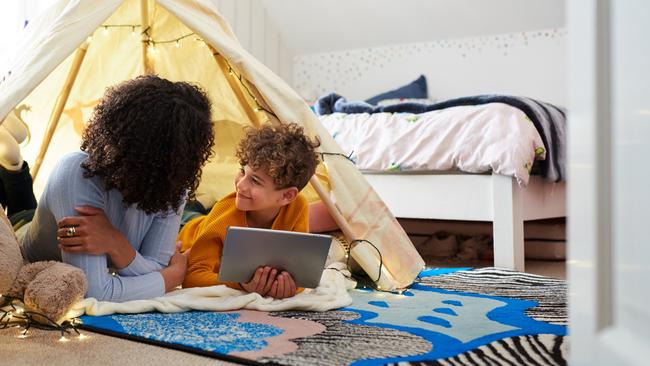How much is too much? Researchers are urging a rethink on screen time limits for children saying what they’re doing is more important than how long they’re spending online
Policing screen time might not be the most effective – or helpful – way to manage your child’s social media use in 2020. Here is why it might be time parents put their stop watches away. POLL

Education
Don't miss out on the headlines from Education. Followed categories will be added to My News.
- Single-sex vs co-ed: Adelaide’s top educators debate merits
- Positives and negatives of Gen Alpha revealed by parents, teachers
- Latest subscriber only rewards and competitions
The effectiveness of strict screen time limits for kids is being questioned with some experts now calling for parental guidelines around technology use to be reassessed.
The concern is that by fixating on screen time, parents miss opportunities to connect with and support their children, including around safety, identifying misinformation and dealing with cyber-bullying.
Swinburne University of Technology’s Brittany Huber says what children do on and off screen matters more than how much time they’re exposed to it.
“It is important the focus is on what they are doing, rather than how long they are doing it for,” Dr Huber, who studied screen time and children’s use of screen media for her PhD, said this week.
“We need parents to become more open-minded and less obsessed about (screen time) – not all screen time is ‘bad’.”
Dr Huber said linking screen time with a lack of physical activity wsn’t as straightforward as it once was.
“The lines are now blurred and screen time does not necessarily equal sedentary time – I myself have been doing soccer skill sessions from YouTube,” she said.
“The biggest concern in relation to having too much screen time is that it takes the place of other activities, such as engaging with others but if you are playing video games and talking with your friends, that is social, it ticks that box.
“Digital time can also be creative, (for example) kids create content and combine recorded audio with their own footage.”
Dr Huber says “demonising” screen time isn’t helpful and it’s important to regularly revisit guidelines and recommendations.
“It is not going away, technology is going to continue to evolve so we need to look at how best to integrate it into family life rather than just policing it,” she said.
US digital educator and advocacy group Common Sense Media is also arguing for a shift in focus.
“(The global coronavirus pandemic means) now more than ever, there is a need to flip the script around screen time from concerns over time spent online to how to safely connect adolescents to their schools, peers, family networks and communities while … ensuring guardrails are in place,” the organisation concludes in a newly-released report.
UK-based Sonia Livingstone, co-author of Parenting for a Digital Future, says counting the hours of screen time misses the point when it comes to helping children “make good judgments about what they do online.”
“Finally, disagreements over screen time is a leading cause of conflict in families … conflict over what young people are spending their time online doing happens much less frequently,” Dr Livingstone said.
Australia’s eSafety Commissioner, Julie Inman Grant, agrees “not all screen time is created equal”.
“It can be easy to focus only on the clock but the quality and nature of what children and young people are doing online, and parental involvement, are just as important,” she said.
“The quality of the apps and platforms your child is using, their age-appropriateness, and above all their safety, are key factors parents should consider.
“Our message is: be involved in your children’s online lives, just as you are in their everyday lives.”
